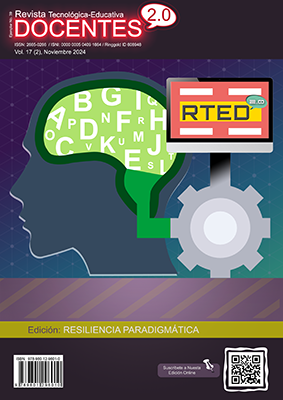Interculturality Language and Education from the Sciological Perspective
 DOI:
https://doi.org/10.37843/rted.v17i2.535
DOI:
https://doi.org/10.37843/rted.v17i2.535
Main Article Content
Abstract
Culture shapes the identity of nations; it is part of our being when we adapt to societies that are inclusive of diversity. The objective of the investigative work was to dimension the transversal intercultural context with education to reconnect inclusive societies supported by the right of freedom of choice. This essay was framed using the inductive method, hermeneutic paradigm, qualitative interpretive approach, and topical narrative design. Interculturality as communication represents a challenge in coexistence, interaction, and relationships to prevail over inequality and horizontality with respect. It means guiding the democratization of knowledge toward developing local, regional, and spheres. In this regard, the reflections argue that international discourse influences the content priorities of inclusion and education in postmodern societies. This means intercultural education in the complex learning environment converges with critical multiculturalism in its inclination toward l and the global community.
Downloads
Metrics
Article Details

This work is licensed under a Creative Commons Attribution-NonCommercial-NoDerivatives 4.0 International License.
Those authors who have publications in our journal accept the following terms:
- When a work is accepted for publication, the author retains rights of reproduction, distribution of his/her article for exploitation in all countries of the world in the format provided by our magazine and any other magnetic medium, optical, and digital.
- Authors will retain their copyright and guarantee the journal the right first to publish their work, which will be simultaneously subject to the Creative Commons Acknowledgment License (Attribution-NonCommercial-NoDerivatives 4.0 International (CC BY-NC-ND 4.0)). That allows third parties to copy and redistribute the material in any medium or format, under the following conditions: Acknowledgment - You must properly acknowledge authorship, provide a link to the license, and indicate if any changes have been made. You may do so in any reasonable way, but not in a way that suggests you have the licensor's endorsement or receive it for your use. NonCommercial - You may not use the material for a commercial purpose. NoDerivatives - If you remix, transform, or build from the material, you cannot broadcast the modified material. There are no additional restrictions - You cannot apply legal terms or technological measures that legally restrict you from doing what the license allows.
- Authors may adopt other non-exclusive license agreements to distribute the published version of the work (e.g., deposit it in an institutional archive or publish it in a monographic volume) provided that the initial publication in this journal is indicated.
- Authors are allowed and recommended to disseminate their work through the Internet (e.g., in institutional telematic archives, repositories, libraries, or their website), producing exciting exchanges and increasing the published work's citations.
- Request of withdrawal an article has to be done in writing by the author to the Editor, becoming effective after a written response from the Editor. For this purpose, the author or authors will send correspondence via e-mail: [email protected].
- The author will not receive financial compensation for the publication of his work.
- All Docentes 2.0 Journal publications are under the Open Journal System (OJS) platform at: https://ojs.docentes20.com/.
References
Banco Mundial. (2015). Latinoamérica Indígena en el Siglo XXI. Banco Mundial.
Bauman, Z. (2007). Los retos de la educación en la modernidad líquida. Gedisa.
Coneval. (2022). Comunicado No. 15. Educación para la población indígena en México: el derecho a una educación intercultural y bilingüe. Consejo Nacional de Evaluación de la política Social.
Consejo Nacional de Población. (2020). Población indígena en México. Gobierno de México https://n9.cl/8lm5n
Díaz-Aguado, M. J. (1995). Educación intercultural y desarrollo de la tolerancia. Revista de Pedagogía. 307, 163-183. DOI: 10.4438/1988-592X-0034-8082-RE
Dietz, G. (2009a). El paradigma de la diversidad: tesis para el debate educativo. En: COMIE (ed): IX Congreso Nacional de Investigación Educativa. Consejo Mexicano de Investigación Educativa, A.C., pp. 297-347.
Dietz, G. & Mateos-Cortés, L. S. (2013). Interculturalidad y educación intercultural en México. SEP.
Esperanza, R. T. (2011). La Construcción de una democracia intercultural. En Los movimientos sociales en la construcción del estado y de la nación intercultural. Huygens.
Frankl, V. (2019). El hombre en busca de sentido. Herder.
Giroux, H. A. (1993). Vivir peligrosamente: las políticas de identidad y el nuevo racismo cultural: hacia una pedagogía crítica de la representación. Contrapuntos, 1, 89-124. http://www.jstor.org/stable/45136433.
Habermas, J. (1998). Más allá del Estado nacional. Trotta.
Kosík, K. (1985). Dialéctica de lo concreto. Grijalbo.
Medina-Melgarejo, P. (2003). ONG y redes electrónicas en educación intercultural: prácticas y ámbitos en tensión. En M. Bertely Buquest (coord.): Educación, derechos sociales y equidad. Consejo Mexicano de Investigación Educativa.
Mujica-Sequera, R. (2023). Diseño Tecnopedagógico en la Programación Didáctica. Revista Tecnológica-Educativa Docentes 2.0, 16(1), 43-48. https://doi.org/10.37843/rted.v16i1.313. DOI: https://doi.org/10.37843/rted.v16i2.313
Morín, E. (2005). Introducción al pensamiento complejo. Gedisa.
Mclaren, P. (1997). Multiculturalismo revolucionario. Siglo XXI.
Naciones Unidas. (2016). Objetivos del Desarrollo Sostenible. https://n9.cl/w4ma
National Geographic en español. (2024). ¿Cuántas lenguas de hablan en el mundo? https://n9.cl/04mo5k
Unesco. (2021). Pueblos indígenas. https://es.unesco.org
Sartori, G. (2000). La sociedad multiétnica. Epublibre.
Schmelkes, S. (2003). Educación superior intercultural: el caso de México. ANUIES.
Schmelkes, S. (2013). Educación para un México intercultural. Sinéctica. https://n9.cl/2k6bd
Vertovec, S. (2007). Introduction: New Directions in the Anthropology of Migration and Multiculturalism. Ethnic and Racial Studies, 30 (6), 961-978. https://doi.org/10.1080/01419870701599416. DOI: https://doi.org/10.1080/01419870701599416
Zemelman, H. (2011). Configuraciones críticas. Grupo Editorial Siglo veintiuno.






